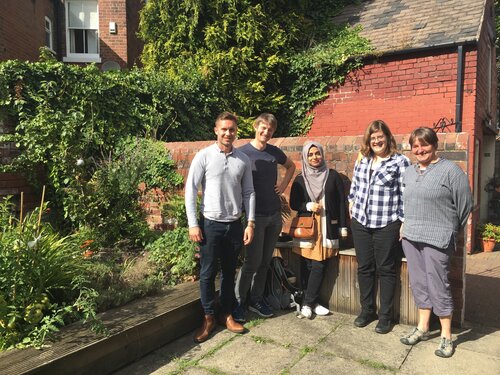Session ran by Jan Mayor, Waypoint
Blog write up by Dr Saira Khan
13th September 2019
Project 6 is a voluntary sector drug and alcohol charity based in Keighley, West Yorkshire and Sheffield, South Yorkshire. They help people reduce the risks associated with substance misuse and we offer highly effective, evidence based support to drug and alcohol users and their families.
Sheffield Alcohol Support Service (SASS) came together with project 6 to help local communities.
There are 2 types of support for alcohol abuse, one is the conventional alcoholic anonymous, and the other is SMART Recovery.
- AA originated in America.
- SMART stands for Self Management and Recovery Training

SMART uses a ‘four-point programme’. These four points include:
- Enhance and maintain motivation to abstain
- Cope with urges
- Manage thoughts, feelings, and behaviours
- Balance momentary and enduring satisfactions

This framework encourages participants to map out their own path to recovery. SMART shifts participants’ ‘locus of control’ to an internal position and therefore allowing them to shape their own destiny. AA, on the other hand, encourages members to seek the help of a ‘higher power.’
- This is why in Americans in general prefer AA, as patients are more religious than in the UK.
SMART is less that that the patient is an ‘alcoholic’ and more that he has developed a ‘addiction’.
- SMART considers addiction to be the physical act of drinking alcohol or taking drugs, and once an addict is in ‘recovery’ the ‘addiction’ ceases to exist.
- AA holds that an addict is always an addict for the rest of his or her adult life.
- Which is why SMART instead focuses on highlighting irrational beliefs that risk a relapse episode in the present.
This was conveyed by a former addict, he himself preferred the SMART process and was not an advocate for AA. However it was acknowledged that everyone is on their own journey, and this new trainer understood that not everyone was like him.
Smart believes drinking is a learnt behaviour which can be unlearnt. Similar to cbt. Saying the story again can be counter-productive. Whereas AA is normally saying it’s a higher feeling that makes you more likely to drink, therefore you need to stop it. There are 12 steps. Making them admit they have lost power over their addiction.
“I’m not fixed and you’re not broken”

Some people needed to fill the gap that was used for drinking with something else. There is a Northern College, Wakefield for people with benefits is free, has childcare, they will have transport. Another programme called Fresh start, this is for women who have had children removed.
Freedom programme
- looks at domestic violence
- Focusses on the perpetrator (for the victims)
- Helps them understand why it happened
Weekly timetable for alcohol recovery community (right)
Patient Experiences

A lot of feeling of being self-aware and internalised judgement. So any hint of judgement would be ruined in the relationship. This patient did think it was the depression that was making him drink and making him feel like he wasn’t quite right. But it was actually the drinking. He didn’t want to go to the SMART meetings, instead just met general people informally.
He felt that blood tests can come as a realisation to the patients. As they thought they’d been “getting away with it” the whole time. “Create that crisis with bad blood tests”
If raised GGT with alcohol use, shouldn’t be driving at all, at least 6 months. At least if 60units a week then for DVLA. Are stated as a hazard.
He stated:- “Define what normal is.”
This stayed with me when he would say people would want him to go back to normal, he said what exactly is normal.
Another person wanted to join the session, however he felt that GP’s didn’t understand, and immediately reverted into saying his credentials. He already felt that without us saying anything that we had looked down on him, and felt that we were judging him. This would have been based on all of his prior experiences with medical professionals. Ultimately he should’ve felt that the GP was a safe place and he didn’t.
It made me realise that being judgemental can come across in body language, and in small cues that you say. Sometimes it doesn’t accumulate to us being judgemental, but how one person described that he felt ashamed every time he saw a health professional, and he projected this onto them.
Five ways to well-being

